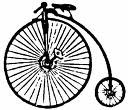I haven't been around much lately; a combination of freelance work, financial capability training, and other bits and pieces have taken up my time. For a while, however, I have been meaning to review one of my favourite books, Cranford. (There is also a very good BBC television series, starring Judi Dench, which is true to the books in spirit, if not in the letter of the plot.)
Elizabeth Gaskell's wonderful town of Cranford is populated almost entirely by lone women. Miss Matty Jenkyns and her sister Deborah are the main characters when the stories begin. They are the daughters of a clergyman, with limited means, who live in a small, comfortable house in the centre of the town. They are generous, thoughtful friends and hosts, but there is no formality or grandeur about their lives.
They have a single servant, and practice economical habits - Miss Matty for instance being particularly concerned about not wasting candles. New dresses are a rarity for them and their friends, although Miss Matty relishes the process of choosing a dress when the occasion arises, and the ladies buy the occasional pretty new bonnet for variety, and to show that they are following the fashions.
After Miss Deborah's death, and a subsequent disaster, Miss Matty's financial resources are reduced considerably. Movingly, Miss Matty's friends, themselves all relatively impoverished, contribute without her knowledge to supplement her income, and Miss Matty sets up a small tea shop from her home, which she runs quite successfully until she is rescued from her financial troubles...
'There [in Cranford] economy was always 'elegant' and money-spending always 'vulgar and ostentatious'; a sort of sour-grapeism which made us all very peaceful and satisfied'.
I am thinking of adopting the Cranford ladies as my role models in their approach to life, as well as their finances.... They enjoy life, adapt to changing circumstances, are imaginative, thrifty, creative, and charitable. Within the limits of their society and time, they take control of their lives.



